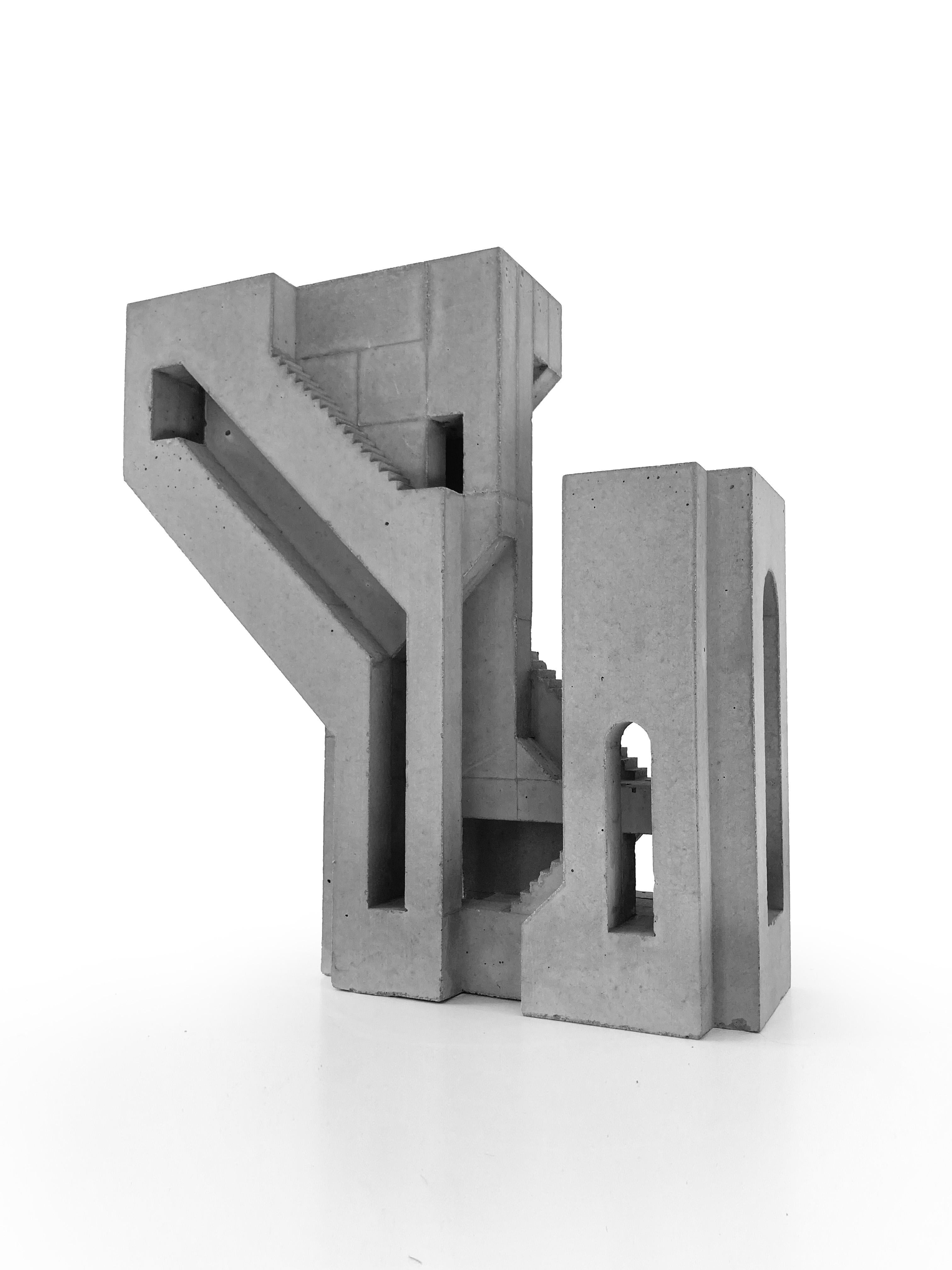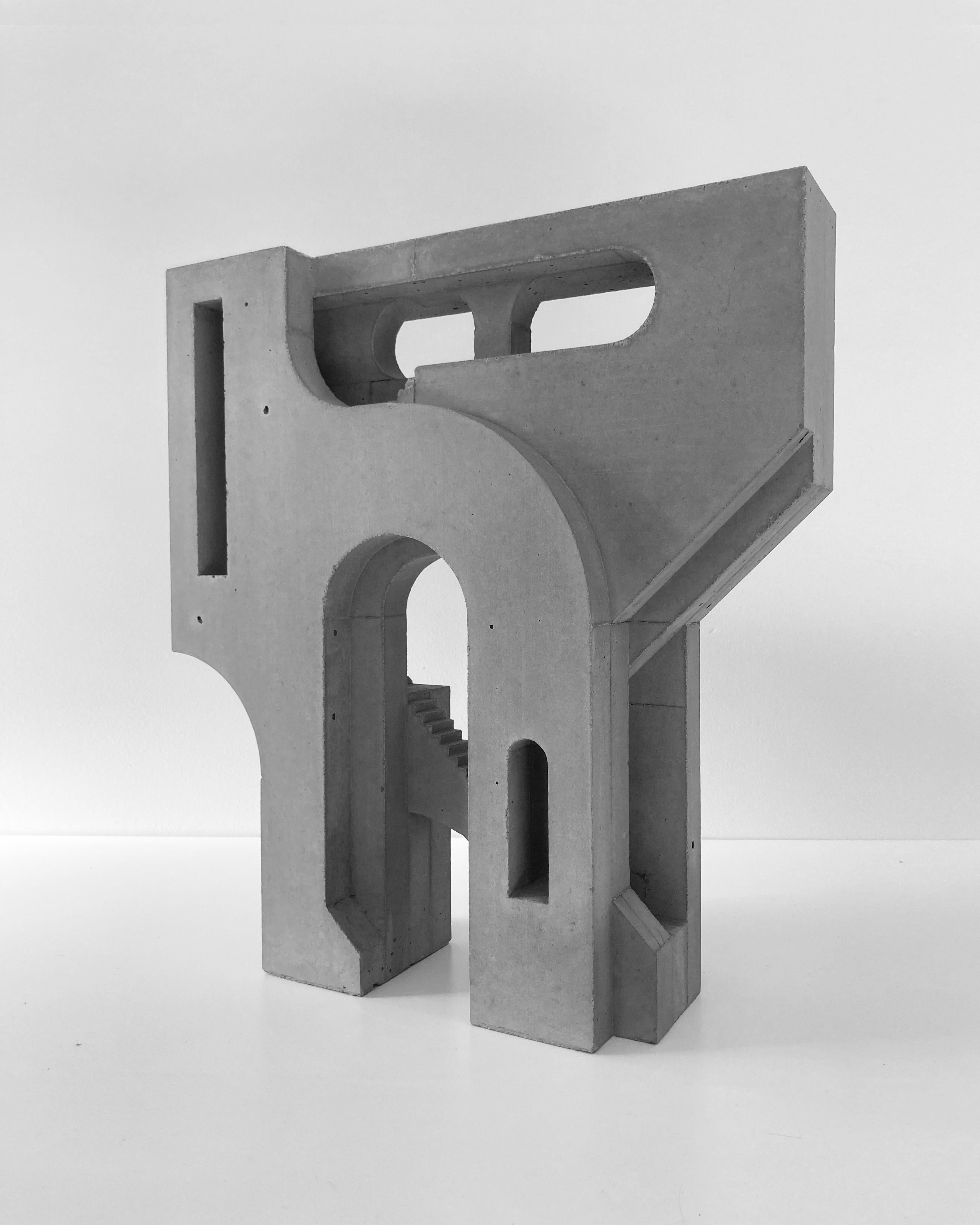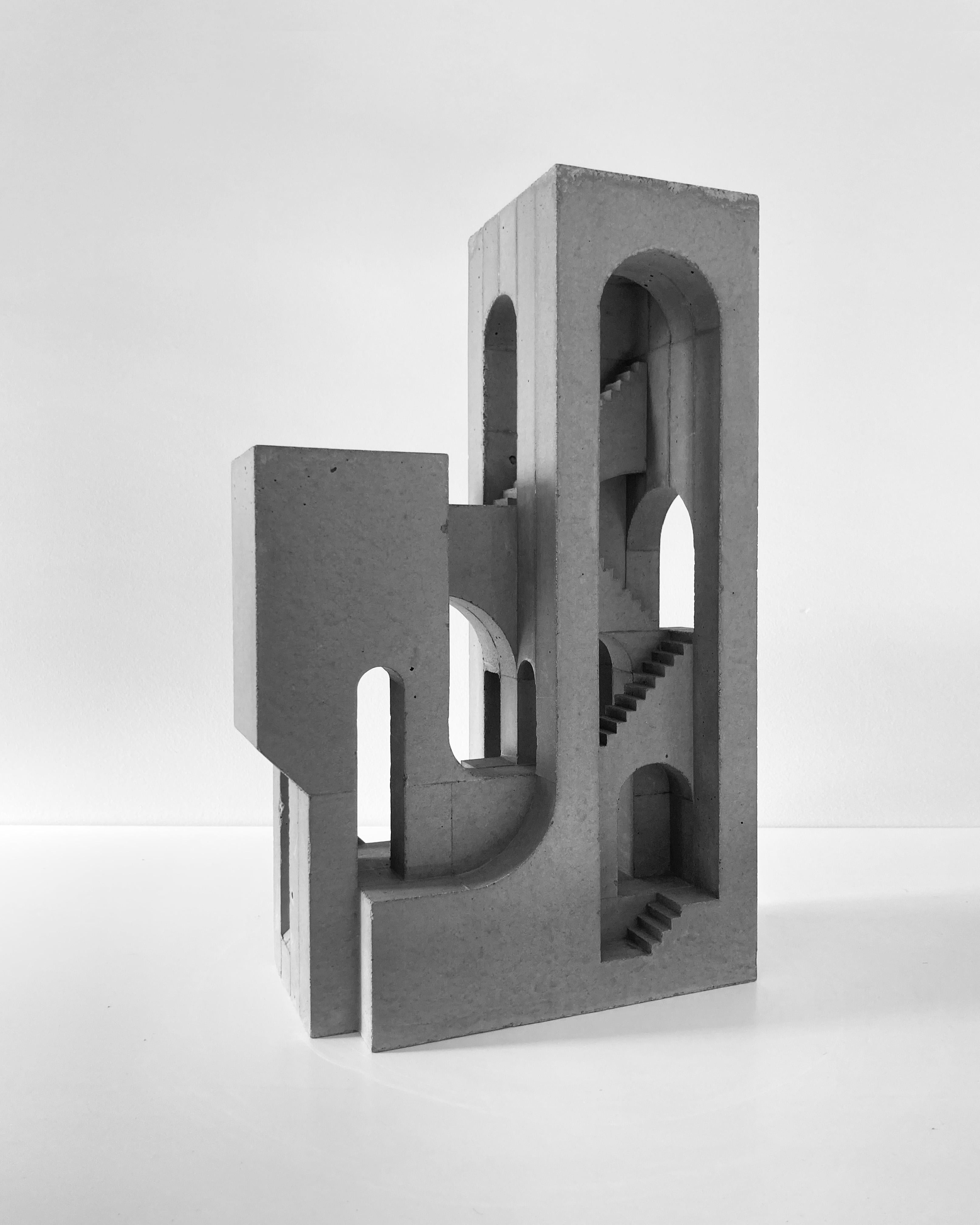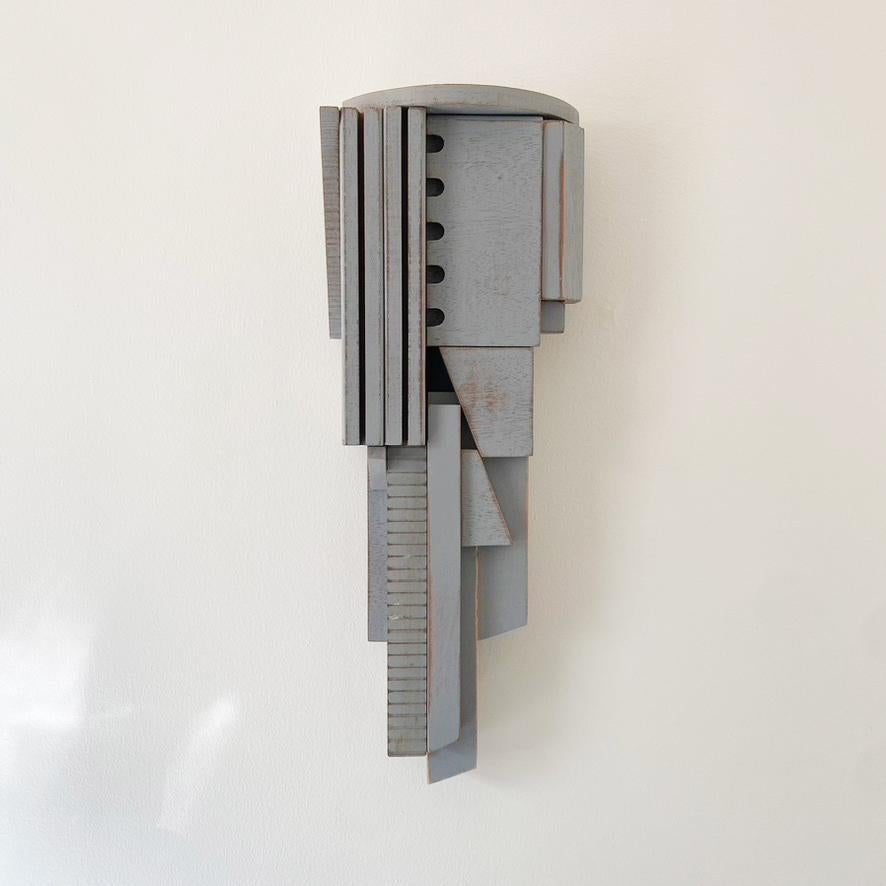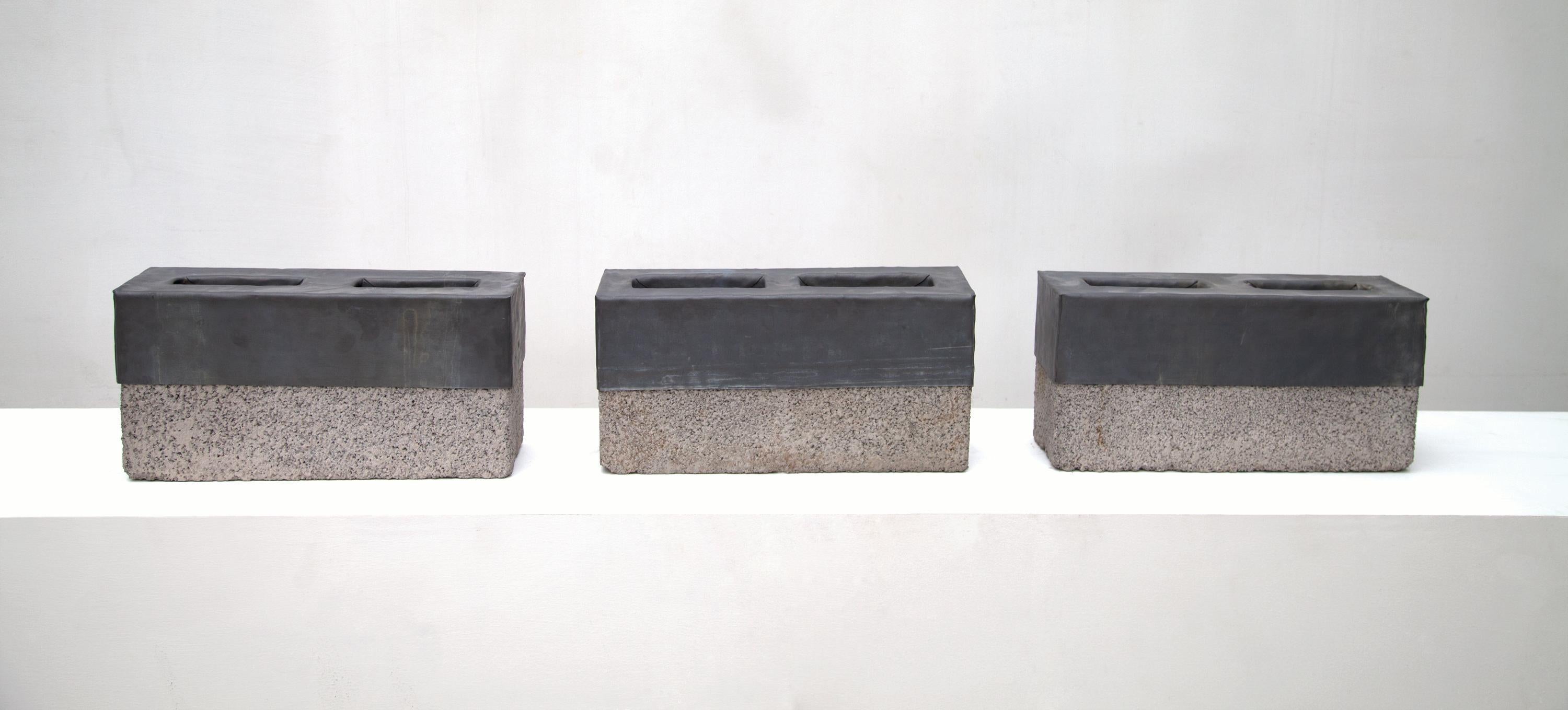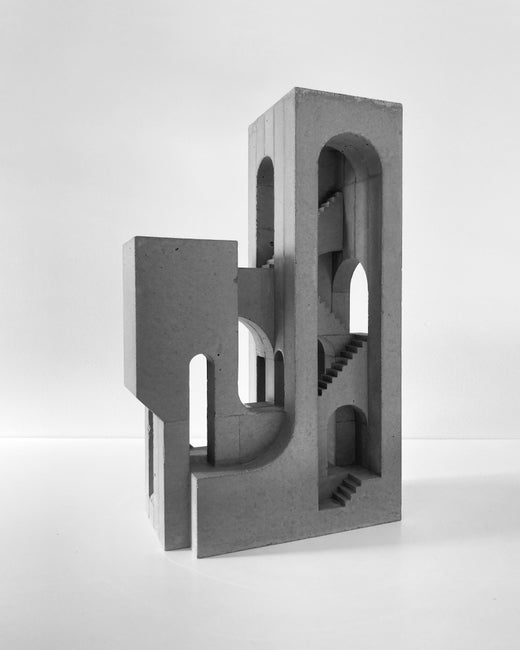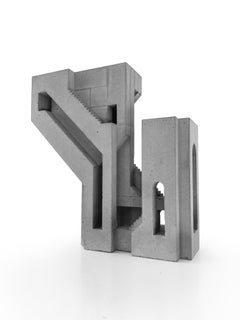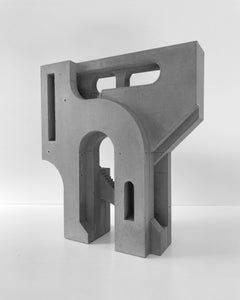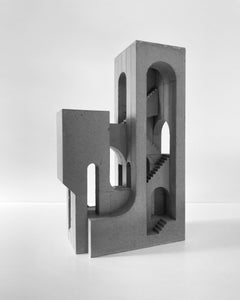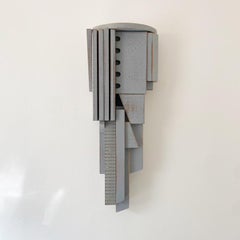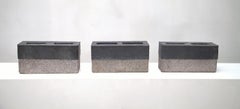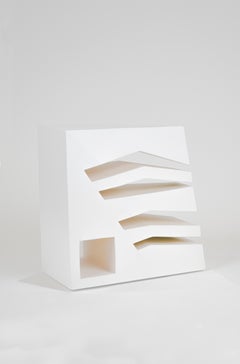Want more images or videos?
Request additional images or videos from the seller
1 of 5
David UmemotoCityblock Level 1-62022
2022
$1,500
£1,145.37
€1,304.05
CA$2,106.24
A$2,302.53
CHF 1,218.14
MX$27,553.46
NOK 15,499.10
SEK 14,187.86
DKK 9,740.42
About the Item
The concrete works of David Umemoto stand as studies about volume. At the juncture of sculpture and architecture, these miniature pieces evoke temporary buildings or monuments standing on far-away lands. The images conveyed in the mind by these works are numerous. They refer to the archaic and the ephemeral, despite the solidity and the modernity of the medium. Appearing before our eyes are pre-Columbian rock dwellings, god statues from the Andes or Easter Island, steles deteriorated by rain, remnants of modern cities having survived a cataclysm, fragments of Babylonian cities, colonial settlements brought down to their foundations, cenotaphs abandoned in the jungle…
The production of David Umemoto’s works follows a process of slow and silent transformation. The creative process seeks to imitate the cycles of nature, which are cycles of erosion and re-creation. Lines shift, change and are in a state of perpetual mutation due to the influence of time and weather. The natural architectures of geological strata and crystals stand as models: They inspire the design of the moulds in which the concrete is cast. The ductile and infinitely adaptive nature of the material enables the production of objects that are both similar and different. The development of the works is thoughtful and iterative yet it makes room for improvisation, adaptation, and spontaneous inspiration. The shapes created by Umemoto line up in sequences of combinatorial variations. Each work offers a different face but these faces all belong to the same lineage. This kinship gives a strong unity to Umemoto’s production and allows for the exploration of the theme of transformation through time and tradition.
All of Umemoto’s pieces are handmade, in order to respect an economy of means. The pressure of modernity imposes on man the obligation to evolve constantly, which leads him into an endless race towards technological improvement. As an artist, Umemoto chooses to react by taking a step backwards. His manual activities result from a desire to simplify artistic practice. Aesthetics and formalism are thus combined with a commitment to plainness. Opting for a low-tech stance, the artist wants to resist the demands of progress. He creates structured and modular pieces but these never perfectly fit together, a result of their willingly imperfect mode of production.
Umemoto’s art is rooted in Americanness: His varied creations take their impetus from a desire to start settlements and to colonize wild lands, where nature is always on the verge of resuming its rights. When one sees Umemoto’s architecture sculptures, one thinks of the modernist complex of Brasilia by Niemeyer, lost in the Amazonian jungle, or of the complex of Chandigarh by Le Corbusier, in the heart of India. The walls rising towards nowhere, the curves running into ceilings, and the staircases leading into the void are reminiscent of the mysterious Prisons of Piranesi. One way or another, these are always works where imagination joins forces with a contemplative discipline.
- Creator:David Umemoto (1975, Canadian)
- Creation Year:2022
- Dimensions:Height: 8 in (20.32 cm)Width: 8 in (20.32 cm)Depth: 8 in (20.32 cm)
- Medium:
- Movement & Style:
- Period:
- Condition:
- Gallery Location:Montreal, CA
- Reference Number:1stDibs: LU47615253502
David Umemoto
The concrete works of David Umemoto stand as studies about volume. At the juncture of sculpture and architecture, these miniature pieces evoke temporary buildings or monuments standing on far-away lands. The images conveyed in the mind by these works are numerous. They refer to the archaic and the ephemeral, despite the solidity and the modernity of the medium. Appearing before our eyes are pre-Columbian rock dwellings, god statues from the Andes or Easter Island, steles deteriorated by rain, remnants of modern cities having survived a cataclysm, fragments of Babylonian cities, colonial settlements brought down to their foundations, cenotaphs abandoned in the jungle… The production of David Umemoto’s works follows a process of slow and silent transformation. The creative process seeks to imitate the cycles of nature, which are cycles of erosion and re-creation. Lines shift, change and are in a state of perpetual mutation due to the influence of time and weather. The natural architectures of geological strata and crystals stand as models: They inspire the design of the moulds in which the concrete is cast. The ductile and infinitely adaptive nature of the material enables the production of objects that are both similar and different. The development of the works is thoughtful and iterative yet it makes room for improvisation, adaptation, and spontaneous inspiration. The shapes created by Umemoto line up in sequences of combinatorial variations. Each work offers a different face but these faces all belong to the same lineage. This kinship gives a strong unity to Umemoto’s production and allows for the exploration of the theme of transformation through time and tradition. All of Umemoto’s pieces are handmade, in order to respect an economy of means. The pressure of modernity imposes on man the obligation to evolve constantly, which leads him into an endless race towards technological improvement. As an artist, Umemoto chooses to react by taking a step backwards. His manual activities result from a desire to simplify artistic practice. Aesthetics and formalism are thus combined with a commitment to plainness. Opting for a low-tech stance, the artist wants to resist the demands of progress. He creates structured and modular pieces but these never perfectly fit together, a result of their willingly imperfect mode of production. Umemoto’s art is rooted in Americanness: His varied creations take their impetus from a desire to start settlements and to colonize wild lands, where nature is always on the verge of resuming its rights. When one sees Umemoto’s architecture sculptures, one thinks of the modernist complex of Brasilia by Niemeyer, lost in the Amazonian jungle, or of the complex of Chandigarh by Le Corbusier, in the heart of India. The walls rising towards nowhere, the curves running into ceilings, and the staircases leading into the void are reminiscent of the mysterious Prisons of Piranesi. One way or another, these are always works where imagination joins forces with a contemplative discipline.
About the Seller
5.0
Vetted Professional Seller
Every seller passes strict standards for authenticity and reliability
Established in 1996
1stDibs seller since 2014
105 sales on 1stDibs
- ShippingRetrieving quote...Shipping from: Montreal, Canada
- Return Policy
More From This Seller
View AllCitadel no.1
By David Umemoto
Located in Montreal, Quebec
David Umemoto transforms concrete structures into fantastical worlds by reinterpreting recognizable architectural forms. Staircases, archways, corridors, and ramps are miniaturized, ...
Category
2010s Contemporary Figurative Sculptures
Materials
Concrete
Sacred Place
By David Umemoto
Located in Montreal, Quebec
The concrete works of David Umemoto stand as studies about volume. At the juncture of sculpture and architecture, these miniature pieces evoke temporary buildings or monuments standi...
Category
2010s Contemporary Figurative Sculptures
Materials
Concrete
Citadel no.2
By David Umemoto
Located in Montreal, Quebec
David Umemoto transforms concrete structures into fantastical worlds by reinterpreting recognizable architectural forms. Staircases, archways, corridors, and ramps are miniaturized, ...
Category
2010s Contemporary Figurative Sculptures
Materials
Concrete
Citadel no.4
By David Umemoto
Located in Montreal, Quebec
David Umemoto transforms concrete structures into fantastical worlds by reinterpreting recognizable architectural forms. Staircases, archways, corridors, and ramps are miniaturized, ...
Category
2010s Contemporary Figurative Sculptures
Materials
Concrete
Untitled
By Guillaume Lachapelle
Located in Montreal, Quebec
Guillaume Lachapelle’s artistic practice is shaped predominantly by sculpture, expressed in the form of installations and detailed miniature models. Lachapelle presents playful universes which combine objects of undetermined purpose; in this way, he opens the conventions of our reality to fresh disposition. The architecture of his models – which Lachapelle has recently begun to make with the help of the latest 3-D printing technology – shows motifs originating from the everyday, certainly, but seeming strange, alienating or even uncanny when combined as the artist chooses. A kind of transition between two worlds often appears in Lachapelle’s work – for example when the model of a library filled with books curves inwards and reveals a mysterious opening pointing into darkness – these are the artist’s references to spaces and occurrences which may be concealed below the surface of outward semblance.
Guillaume Lachapelle has participated in several solo and group exhibitions including Manèges at Circa – Centre d’Exposition Art Contemporain (Montreal) in 2006; Quebec Gold at the Ancien Collège des Jésuites (Rheims, France) in 2008 and in Abracadabra (Edward Day...
Category
2010s Contemporary Abstract Sculptures
Materials
Nylon, Acrylic
Mystérieuse pyramide
By Eric Lamontagne
Located in Montreal, Quebec
In recent years, Eric Lamontagne has been interested in questions like perception, illusion and our relation to the invisible, through the development of works that blur the boundari...
Category
2010s Contemporary Figurative Sculptures
Materials
Mirror, Wood, Glue, Mixed Media
You May Also Like
American Contemporary Sculpture by Scott Troxel - Balken
By Scott Troxel
Located in Paris, IDF
Artwork made with spray acrylic on solid mahogany, cherry & oak
Scott Troxel draws on the aesthetics of bygone technology and the forward-looking designs of the Atomic Age and mid-c...
Category
2010s Abstract Abstract Sculptures
Materials
Mahogany, Oak, Spray Paint
Sculpture, Cinder Blocks For my Father
By Alberto Montaño Mason
Located in Cuernavaca, Morelos
Ash and lead blocks.
Piece made of 3 blocks
Exhibited at the International Art Fair, Zona Maco 2019 in Mexico City.
Exhibited at Mana Contemporary at Jersey City, New Jersey in 201...
Category
21st Century and Contemporary Conceptual Abstract Sculptures
Materials
Metal
Cuadrado Diagonal - 21st Century, Contemporary Art, Abstract Sculpture, Iron
By Daniel Suárez
Located in Barcelona, Catalonia
Technique: Painted iron
"His works, far from imposing, negotiate with the environment. And this exchange is possible because there is a correspondence of properties between one and ...
Category
21st Century and Contemporary Contemporary Abstract Sculptures
Materials
Iron
Homenaje A La Levedad III - 21st Century, Contemporary, Abstract, Iron Sculpture
By Lukas Ulmi
Located in Barcelona, Catalonia
Lukas Ulmi’s work unveils the hidden beauty of shapes taking stones, seemingly static forms, incomplete or meaningless objects and turning them into authentic sculptures where weight...
Category
21st Century and Contemporary Contemporary Abstract Sculptures
Materials
Iron
Japanese Contemporary Art By Kojun - Shiko 10
By Kojun
Located in Paris, IDF
Lego, gold leaf (24k, 22.66k), copper wire, wood
This collaborative work, which began with a common interest in Buddhism, explored the idea of expressing the sacred within everyday life.
As artist and Zen monk...
Category
2010s Conceptual Still-life Sculptures
Materials
Gold Leaf, Wire
Abstract Cityscape Sculpture, Mid 20th Century
Located in Beachwood, OH
Abstract Cityscape, c. 1950-60
Painted mixed metal
19.25 in. h. x 19.5 in. w. x 11.5 in. d.
Category
1950s Abstract Abstract Sculptures
Materials
Metal
